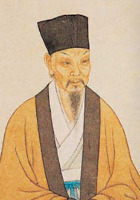Su Shi
Su Shi Poems
Sunset cloud gather far excess clear cold
Milky Way silent turn jade plate
This life this night not long good
Next year bright moon where see
...
Drinking through the night at East Slope,
still drunk on waking-up,
I return home around midnight.
My house-boy snores like thunder,
...
Well bottom deep warmth return not return
Sighing cold rain wet withered root
What person more like come to teacher
Not be flower time willing come alone
...
To what can our life on earth be likened?
To a flock of geese,
alighting on the snow.
Sometimes leaving a trace of their passage.
...
Lonely east slope a sick old man
White hair dull loose all frost wind
Son mistaken happy red face at
A smile that know is alcohol red
A lonely sick old man on eastern slope,
My frosty hair blows loosely in the wind.
My son, mistaken, is pleased by my ruddy face,
I smile: I know it's alcoholic red.
...
Soon know approach end year
be like go to hole snake
Long scales half already disappear
Go all trace who able stop
...
Ten years living dead both boundless
Not think of capacity self hardly possible forget
Thousand li alone grave not place say wife cold
Even if together meet must not recognise
...
Black cloud fly ink not cover hills
White rain leap drops random into boat
Sweep earth wind come suddenly blow disperse
View lake downstairs water like sky
...
White head dull loose all frost wind
Small pavilion rattan bed dependent sick appear
Report doctor spring sleep beautiful
Taoist softly ring fifth watch bell
...
Silkworm grow old
Wheat half yellow
Around mountain rain unrestrained
Farmer person stop plough
...
The Best Poem Of Su Shi
Mid-Autumn Moon
Sunset cloud gather far excess clear cold
Milky Way silent turn jade plate
This life this night not long good
Next year bright moon where see
The sunset clouds are gathered far away, it's clear and cold,
The Milky Way is silent, I turn to the jade plate.
The goodness of this life and of this night will not last for long,
Next year where will I watch the bright moon?
Su Shi Comments
from Wikipedia: Su Shi (January 8,1037 – August 24,1101) , also known as Su Tungpo, was a Chinese writer, poet, painter, calligrapher, pharmacologist, gastronome, and a statesman of the Song dynasty. A major personality of the Song era, Su was an important figure in Song Dynasty politics, aligning himself with Sima Guang and others, against the New Policy party led by Wang Anshi. Su Shi was famed as an essayist, and his prose writings lucidly contribute to the understanding of topics such as 11th-century Chinese travel literature or detailed information on the contemporary Chinese iron industry. His poetry has a long history of popularity and influence in China, Japan, and other areas in the near vicinity and is well known in the English-speaking parts of the world through the translations by Arthur Waley, among others. In terms of the arts, Su Shi has some claim to being ''the pre-eminent personality of the eleventh century''.

He was named Shi (軾) by his father Su Xun after a decorative arm rest used in the front part of Chinese carriages. The name was chosen to remind the boy to attend to his public appearance. Similarly, his brother Su Zhe was named after another carriage-related concept, zhe meaning wheel track and implying the boy should try to leave his mark in life. Su Shi's courtesy name was Zizhan. His pseudonym was Dongpo Jushi, from which he is often also referred to as Su Dongpo. Su Shi was born in Meishan, near Mount Omei in what is now Sichuan province. His brother Su Zhe (蘇轍) and his father Su Xun (蘇洵) were both famous literati. Su's early education was conducted under a Taoist priest at a local village school. Later in his childhood, his mother, a highly educated woman conducted his education. In 1057, when Su was 19, he and his brother both passed the (highest-level) civil service examinations to attain the degree of jinshi, a prerequisite for high government office. His accomplishments at such a young age attracted the attention of Emperor Renzong, and also that of Ouyang Xiu, who became Su's patron thereafter. Ouyang had already been known as an admirer of Su Xun, sanctioning his literary style at court and stating that no other pleased him more. When the 1057 jinshi examinations were given, Ouyang Xiu required—without prior notice—that candidates were to write in the ancient prose style when answering questions on the Confucian classics. The Su brothers gained high honors for what were deemed impeccable answers and achieved celebrity status, especially in the case of Su Shi's exceptional performance in the subsequent 1061 decree examinations. [from Wikipedia]